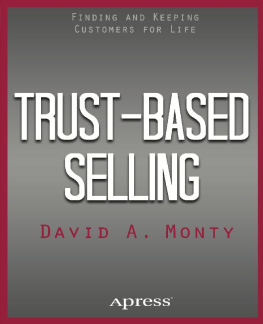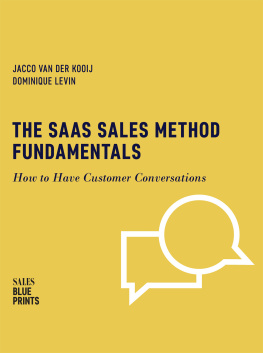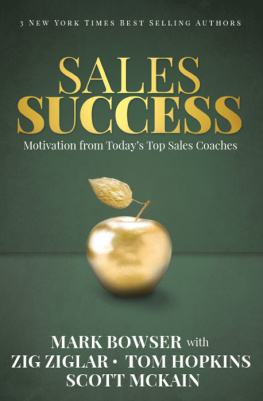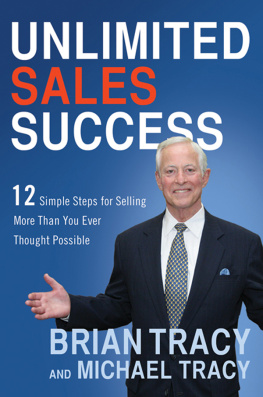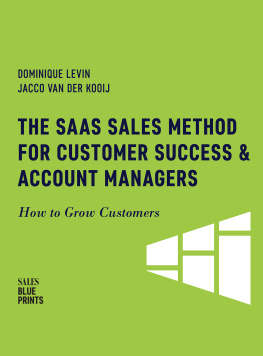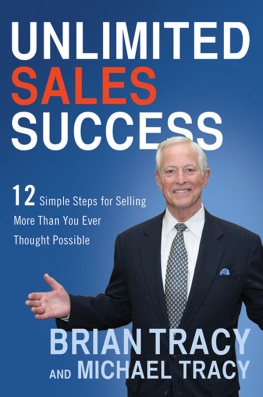Technique and technology are important, but adding trust is the issue of the decade.
Tom Peters
Yet another book on trust ? I know there are several books on sales that discuss trust as a foundation of a selling. However, there is a huge disconnect between the sales processes most companies use today, and reality of selling. Everyone talks about building rapport, but then demonstrate how do this in two minutes at the beginning of a sales call. Trust is not earned in two minutes; it is a continual process that should never stop with your customer.
My goal for this book is to educate you on the importance of developing trust, introduce trust into the sales process, help you develop methods for developing trust over time, and how to maintain trust. In order to drive home the importance of trust, I will lean toward new account acquisitionsituations in which you are starting with zero trust from the customer. The lessons you learn here will, of course, apply to all levels of selling and at all times in your career.
The Ultimate Goal and How It Intersects with Trust
What is your primary role as a salesperson? Its to drive revenue for your company, so the lights can stay on and payroll can be met. While this is true, it immediately points the selling process toward disaster for most salespeople and managers. Conventional thinking is that leads turn into opportunities, opportunities turn into purchase orders, purchase orders turn into invoices, and invoices turn into cash flow. So, where do most sales processes start? Where does most management inspection happen? You guessed rightat opportunity. We will discuss why this is a recipe for disaster in detail in the coming chapters.
For now, let me say that your goal should not be to find and close as many opportunities as possible. Your goal should be to become the customers trusted advisor. Without any trust there is no sale, and with trusted advisor status there is no competition. You dont need to achieve that status in order to win your first opportunity, but why not aim high?
The phrase trusted advisor is, however, thrown around too easily. At one company I worked for, we had an account-planning worksheet. The form was used to rate the level of relationship with the customer. The options were:
I sat through quarterly business reviews for approximately 40 salespeople. We reviewed several accounts for each. Almost half the accounts were marked as trusted advisors. Many of the accounts we reviewed had been through one sales cycle and our company won the business. Management never once challenged the salesperson on the trusted advisor designation. Finally, I could not take it anymore and asked a couple of salespeople to define their definition of trusted advisor. Well, when the customer wants to buy widget X, they purchase from us. Or, I have a customer security badge.
Neither suggests trusted advisor status. Trusted advisor is a simple concept; your customer includes you in their business-planning sessions. Acme Technologies is looking to expand manufacturing into South America. Are you at the table with the customer when they are strategizing the feasibility of this expansion? Are you treated like an extension of the company? Do you have the ability to add value above and beyond the customers team? If the answer is yes, you are a trusted advisor. Do not confuse this with being told they are expanding, and then being asked to quote something to support that initiative. This status is closer to preferred vendor.
A trusted advisor is not the relationship guy or the people person. Relationship being an all-encompassing word, it is worth pointing out that I am talking about a business relationship, a valued business relationship. I am not talking about the guy the customer likes. This is not the vendor who buys lunch all the time. Its the vendor who is part of the customers team, at a peer level, the person who brings value. If an employee is not offering value, he is not part of that company very long, no matter how much he is liked. Same goes with salespeople. You are an extension of the customer team. They are looking for someone they can trust and gain value from.
Being the trusted advisor is a lofty goal that you may never get to, but one you should strive for. So, what is the operative word in trusted advisor? Trusted. Your goal should be to establish trust. Trust starts before you set foot in the door and is hopefully strengthened by every step you take with your customers.
What do I mean by trust ? In a sales relationship, the seller must demonstrate the core elements of trust. The customer from the beginning will judge you on these trust characteristics. They are:
Intent
Capability
Dedication
Results
Lets define each of these in detail.
Intent
Proper intent makes sales a noble profession. There are so many negative stereotypes regarding sales, all of which come from salespeople with wrong intentions. The major theme of this book, shifting from opportunity focus to customer focus, is a shift of intention .
I never thought I would be in sales. I am an educated electrical engineer. I was a nuclear-trained naval officer. I was waiting for a job to open up in a local nuclear power plant when I took an interim sales position 20 years ago. My father was a salesman in the 1970s and 1980s. He always wanted me to do better. So, when I started to sell, and the engineering position I was waiting for didnt open up, I felt stuck in sales. It took me years to realize that sales is a great profession. When I changed my intention from sell them something to becoming a salesperson who wanted to educate and help my customers, my outlook on my career changed, and my sales results skyrocketed. My day-to-day interactions did not change, and my skills did not change overnight, but that small shift in attitude allowed my customers to perceive better intent.
Your customers know your intentions. They see it in the first two minutes of conversation. Are you there to help them or to sell them something?
If you are there to help them, you will sell them something, and if you are there to sell them something, they will help you directly out the door.
Intention and sales skills are tied at the hip.
We tend to judge ourselves
We tend to judge ourselves by our intentions; we tend to judge others by their behavior. Stephen M. Covey
If you are talking non-stop about your product or service, the perception from your customer will be that you are there just to sell something. If you truly get to know the customer, by understanding their needs first, the customers perception of your intent is to help them. If you lack the necessary skills to ask questions and listen, your first step in changing that behavior is to have good intention. Most people believe they are of good character, and that they have proper intent, but your customer can only see your behavior. If you care, you will listen. First and foremost, the customer must perceive you are there to help them. They want to see you are truly listening to their needs. Do you have a hidden agenda or do you have the best interest of all parties in mind? Your intent is to drive value for the customer. We have all heard the 80/20 rule of sales80 percent of sales are done by 20 percent of the sales team. Nothing is more powerful in putting you in the top 20 percent than proper intention.

